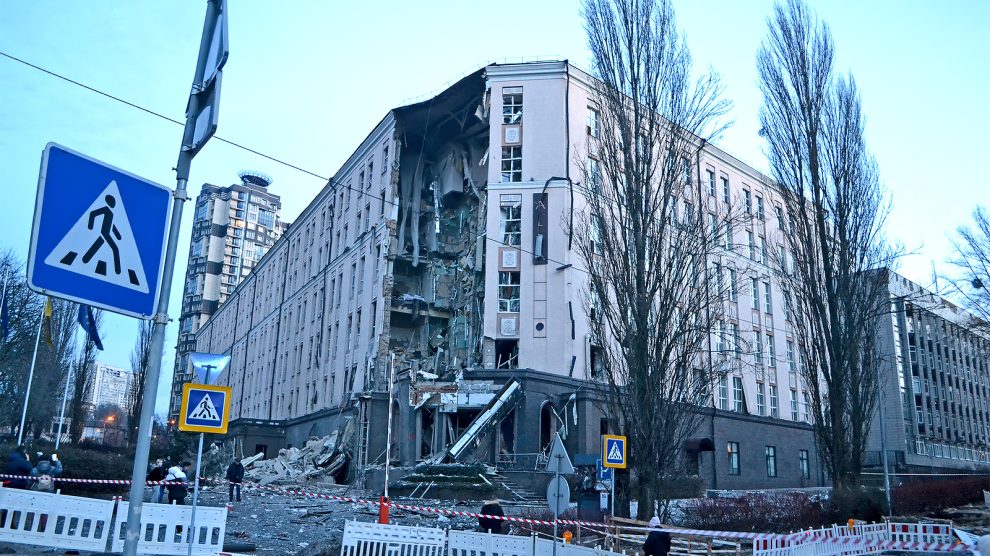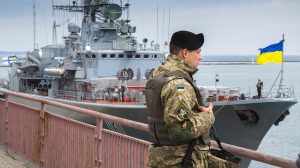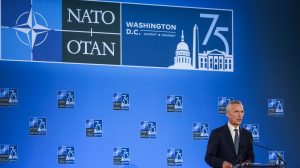Catch up quickly with the stories from Central and Eastern Europe that matter.
Russia’s war on Ukraine
Ukraine’s capital, Kyiv, and its second-largest city, Kharkiv, came under heavy Russian missile attacks on Tuesday, killing at least five people, a day after Vladimir Putin warned that Russia would “intensify” its assault on Ukraine.
Explosions were heard in all districts of the Ukrainian capital on Tuesday morning, shaking buildings in the city centre, in the third successive day of airstrikes on Ukraine
Footage shared on social media by Ukraine’s interior ministry showed several residential buildings, cars and other civilian infrastructure hit by the missile strikes.
The mayor of Kyiv, Vitali Klitschko, said on the Telegram messaging app that an elderly woman had died and at least 41 people had been wounded after the strikes.
The Ukrainian president, Volodymyr Zelensky, praised western-provided defence systems for saving “hundreds of lives”.
Russia escalated its attacks on Ukraine last Friday, launching its largest single attack on the country since the war started, in which at least 41 civilians were killed.
Ukraine and Russia exchanged hundreds of prisoners of war on Wednesday, in what is being described by officials in Kyiv as the biggest swap of the war.
Ukraine said 230 prisoners, including serving members of the armed forces and border guard, had been freed from Russian captivity. In exchange, 248 Russians were released by Ukraine in the deal, mediated by the United Arab Emirates. It is the first major prisoner exchange since last August.
“Our people are home,” Zelensky wrote on social media. “Today, we brought back over 200 warriors and civilians from Russian captivity.”
In a statement, the Russian Ministry of Defence said negotiations had been “difficult”.
The two countries have exchanged prisoners on a number of occasions since the start of Russia’s full-scale war in February 2022, but the Ukrainian leader said last month that the process had slowed down for Russia’s own “very specific reasons”.
Polish farmers blockaded the Medyka border crossing with Ukraine on Thursday, resuming a protest intended to secure government subsidies for corn and prevent tax increases.
The farmers, who are demanding a written agreement with the government, had suspended their protest at the crossing in southeastern Poland on December 24 after a meeting with Agriculture Minister Czesław Siekierski.
Protest leader Roman Kondrow was quoted by Polsat News as saying the farmers were happy with talks they had with the minister and the local governor, but that they wanted a formal agreement.
Polish truck drivers have been blocking several border crossings with Ukraine since November. They want the European Union to reinstate a reciprocal system that requires Ukrainian companies to obtain permits to operate in the bloc.
Other news from the region
Full election results published on January 3 handed Serbia’s ruling party a major victory in parliamentary and local votes held on December 17, amid demonstrations that triggered thousands to protest alleged fraud. President Aleksandar Vučić’s Serbian Progressive party (SNS) won 46.75 per cent of ballots, while the main opposition Serbia Against Violence (SPN) secured 23.66 per cent, according to the country’s electoral commission. Opposition groups have contested the results, and SPN has demanded an international independent investigation by the European Union.
An internal document from Poland’s border guard has highlighted the scale of attempted crossings by migrants and asylum seekers—mostly from the Middle East and Africa—into Poland, Lithuania and Latvia from Belarus. The figures show that over twice as many migrants—around 18,000—were detected by the authorities in Poland in 2023 than in the same period of 2022. The figure also rose on Latvia’s border with Belarus though fell in Lithuania. Since 2021, the Belarusian authorities have been helping migrants to cross the border, in what the EU has described as a “hybrid attack”.
Citizens of Romania and Bulgaria will no longer need a passport from March 31, 2024 to travel by air or sea to most other EU countries as well as Norway and Switzerland, the council of EU governments said on Saturday. The decision extends the EU’s Schengen area to 25 of the 27 EU countries. Romanians and Bulgarians will still face passport checks when crossing land borders to their EU neighbours, though talks on lifting them as well will continue in 2024 and a decision is to be taken on that “within a reasonable time frame”, the European Commission said in a statement.
A long-awaited visa liberalisation scheme allowing Kosovo nationals to travel to Europe’s borderless zone without a visa came into force on Monday. The new regime enables Kosovars to travel to the EU’s passport-free Schengen zone without a visa for periods of up to 90 days in any 180-day period. Kosovo, with a population of 1.8 million, was the last of the six countries in the Western Balkans to get the waiver The reform is perceived in Prishtina as another step toward full recognition and a boost for the ambition of the country that proclaimed independence in 2008 to join the EU.
Czech President Petr Pavel used his New Year speech on Monday to call for concrete steps to move Czechia towards meeting its pledge to adopt the euro. The president added that the EU single currency is a logical future for the country. “After all these years, it is time to start taking concrete steps that will lead us to fulfilling this commitment [to adopt the euro],” said Pavel. “Despite the endless discussions about the advantages and disadvantages of the euro for a country with an open and export-oriented economy, located in the centre of Europe, the single currency is the logical future.”
Bosnia and Herzegovina’s central bank has named economist Jasmina Selimović as its new governor, making her the first woman to head the institution. Selimović, who began serving her six-year term on Wednesday, replaced long-serving chief Senad Softić. In the role, she will assume control of bank regulation and oversee the Balkan nation’s currency board. Bosnia is now the fourth country in the western Balkans with a woman at the helm of its central bank, following Serbia, North Macedonia and Montenegro.
Same-sex couples in Estonia have been able to marry since New Year’s Day, in a milestone move people say brings the Baltic nation closer to its Nordic neighbours. Estonia became the first former Soviet-occupied country to legalise gay marriage when the Riigikogu, Estonia’s parliament, voted in favour of marriage equality in June. A majority of 55 MPs voted for amending the Family Act, while 34 MPs voted against the bill in the 101-seat parliament. “It’s an important moment that shows Estonia is a part of northern Europe,” said Keio Soomelt, the project manager for the Baltic Pride festival.
Discount Romanian airline HiSky has announced that it will launch a service between Bucharest and New York JFK on June 7. The four-times weekly flight will be the first nonstop offering between Romania and the US since legacy Romanian carrier Tarom halted its JFK service in late 2003. HiSky, which began operating in 2021, will fly Bucharest-JFK with an Airbus A330-200 plane. The aircraft, which is the first widebody in the HiSky fleet, is configured with business and economy class cabins. Prices for the ten-hour flight start at 339 euros each-way.
Unlike many news and information platforms, Emerging Europe is free to read, and always will be. There is no paywall here. We are independent, not affiliated with nor representing any political party or business organisation. We want the very best for emerging Europe, nothing more, nothing less. Your support will help us continue to spread the word about this amazing region.
You can contribute here. Thank you.







Add Comment